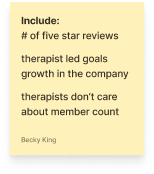When your performance dashboard gives you a pep talk instead of a panic attack.
Therapists at NOCD were burning out on numbers. We rebuilt the dashboard to celebrate growth, connection, and the actual humans behind the data.
Current dashboards made clinicians feel like metric pushers, not humans.
The Problem
The original My Progress page tracked session hours and completion rates but ignored morale. Slack feedback, declining session hours, and employee reviews citing burnout all pointed to the same truth: when a performance tool makes people feel worse about performing, you have a design problem.
The solution: stop designing for compliance and start designing for care.
Therapists as partners, not just users.
Before defining the new structure, I teamed up with the product management team to conduct therapist interviews. We asked simple questions:
What information helps you feel grounded in your work?
What data actually supports you, and what feels like noise?
Their answers shaped both dashboards — from which metrics stayed, to creating an impact board where emotional content would live.
From performance to progress that feels personal.
We renamed My Progress to My Growth, reframed the page around development instead of evaluation, and rewrote system copy to speak like a person instead of a report. Language became the design, shifting the interface’s entire emotional balance.
We flipped the structure so that achievements and recognition appear first, metrics second—celebrating milestones and real messages before data. The top of the dashboard now celebrates professional wins, a small but powerful visual reframe. Moments that matter cards pull in real messages, reviews, and affirmations, using warmth and visual rhythm to offset the cold precision of data.
Leading with meaning, not measurement.
Centering emotive feedback.
The new Moments that matter feature surfaces the human side of therapy—gratitude, breakthroughs, and stories that data can’t show. Positive reviews and Member milestones automatically appear here, creating a living archive of impact. If metrics track progress, Moments that matter captures purpose.
A small redesign that changed how the work felt.
The Response
The founder praised it as a thoughtful reflection of company values. Therapists shared excitement in team meetings, calling it “the first feature that really feels made for us.”
Slack threads filled with appreciation from clinicians and leadership alike.
Not surveys or metrics — just genuine, human reactions. Exactly what My Growth was meant to inspire.
Empathy isn’t a feature, it’s a design principle.
Design can’t remove burnout, but it can reduce emotional friction — reminding people that their daily work adds up to real impact.












